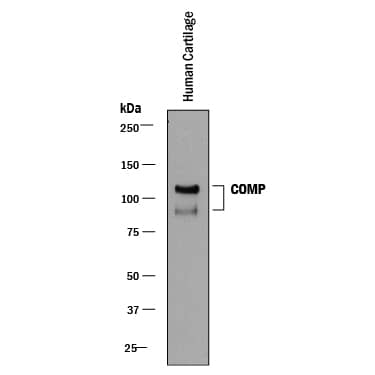Human COMP/Thrombospondin-5 Antibody
R&D Systems, part of Bio-Techne | Catalog # MAB3134

Key Product Details
Species Reactivity
Applications
Label
Antibody Source
Product Specifications
Immunogen
Gln21-Ala757 (Ala256Arg)
Accession # P49747.2
Specificity
Clonality
Host
Isotype
Scientific Data Images for Human COMP/Thrombospondin-5 Antibody
Detection of Human COMP/Thrombospondin‑5 by Western Blot.
Western blot shows lysates of human cartilage tissue. PVDF membrane was probed with 0.05 µg/mL of Mouse Anti-Human COMP/Thrombospondin-5 Monoclonal Antibody (Catalog # MAB3134) followed by HRP-conjugated Anti-Mouse IgG Secondary Antibody (Catalog # HAF018). Specific bands were detected for COMP/Thrombospondin-5 at approximately 90 and 110 kDa (as indicated). This experiment was conducted under reducing conditions and using Immunoblot Buffer Group 1.Applications for Human COMP/Thrombospondin-5 Antibody
Western Blot
Sample: Human cartilage
Formulation, Preparation, and Storage
Purification
Reconstitution
Formulation
Shipping
Stability & Storage
- 12 months from date of receipt, -20 to -70 °C as supplied.
- 1 month, 2 to 8 °C under sterile conditions after reconstitution.
- 6 months, -20 to -70 °C under sterile conditions after reconstitution.
Background: COMP/Thrombospondin-5
Cartilage Oligomeric Matrix Protein (COMP), also known as Thrombospondin-5, is a 110 kDa multidomain calcium binding protein that associates with other extracellular matrix molecules. Thrombospondin-1 and -2 constitute subgroup A and form homotrimers, whereas Thrombospondin-3, -4, and COMP constitute subgroup B and form homopentamers (1-4). The human COMP cDNA encodes a 757 amino acid (aa) precursor that includes a 20 aa signal sequence followed by a non-collagenous coiled-coil domain, four EGF-like repeats, seven TSP type-3 repeats, and a globular TSP C-terminal domain (5). Human COMP shares 86-93% aa sequence identity with rat, mouse, equine, bovine, and canine COMP. Within the TSP type-3 repeats and TSP C-terminal domain, human COMP shares 60%, 61%, 74%, and 80% aa sequence identity with human Thrombospondin-1, -2, -3, and -4, respectively. The coiled coil domain mediates the association of COMP into disulfide-linked homopentamers with a central hub and peripheral globular domains connected by flexible strands (6, 7). An axial pore is formed by the coiled coil assembly and binds vitamin D3 which is involved in bone and cartilage metabolism (8). An RGD sequence in the third TSP type-3 repeat mediates chondrocyte attachment via Integrin alpha5 beta1, although when reduced and in the absence of calcium, attachment is mediated via Integrin alphaV beta3 (9). COMP is upregulated in rheumatoid arthritis and osteoarthritis, hepatocellular carcinomas, chronic pancreatitis, and pancreatic carcinomas (10-12). Elevated circulating COMP levels are used as a biomarker for early onset of some skeletal disorders (10). Several mutations are associated with skeletal dysplasias, and the most common, a point mutation in the third TSP type-3 repeat, results in diminished calcium binding ability (13, 14).
References
- Adams, J.C. and J. Lawler (2004) Int J. Biochem. Cell Biol. 36:961.
- Posey, K.L. et al. (2004) Int. J. Biochem. Cell Biol. 36:1005.
- Adams, J.C. (2004) Int. J. Biochem. Cell Biol. 36:1102.
- Mann, H.H. et al. (2004) J. Biol. Chem. 279:25294.
- Newton, G. et al. (1994) Genomics, 24:435.
- DiCesare, P. et al. (1995) J. Orthopaedic Res. 13:422.
- Efimov, V.P. et al. (1994) FEBS Lett. 341:54.
- Ozbek, S. et al. (2002) EMBO J. 21:5960.
- Chen, F.H. et al. (2005) J. Biol. Chem. 280:32655.
- Wislowska, M. and B. Jablonska (2005) Clin. Rheumatol. 24:278.
- Xiao, Y. et al. (2004) J. Gastroenterol. Hepatol. 19:296.
- Liao, Q. et al. (2003) Scand. J. Gastroenterol. 38:207.
- Kennedy, J. et al. (2005) Eur. J. Hum. Genet. 13:547.
- Hou, J. et al. (2000) Cell Calcium 27:309.
Long Name
Alternate Names
Gene Symbol
UniProt
Additional COMP/Thrombospondin-5 Products
Product Documents for Human COMP/Thrombospondin-5 Antibody
Product Specific Notices for Human COMP/Thrombospondin-5 Antibody
For research use only
